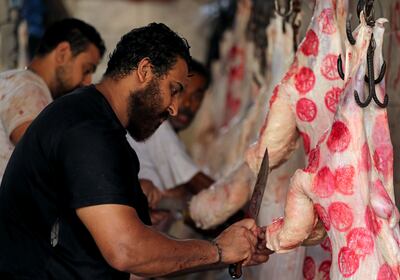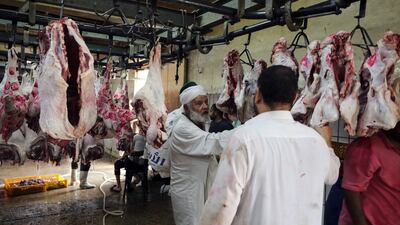Across the world, the rising cost of living has made it difficult for many to afford basic goods and services. Crop failures and soaring energy prices are contributing to global rising inflation rates as millions struggle to make ends meet.
Since January, 'The National' has been tracking the prices of food staples in supermarkets across the Middle East and North Africa, as well as in India, the UK and US to see how consumers have been affected.
Fewer Egyptians can afford to buy livestock for sacrifice this Eid Al Adha due to the country's soaring inflation.
Known as the festival of sacrifice, Eid Al Adha is a time when wealthier Muslims typically slaughter livestock to distribute the meat among the less fortunate. It is a practice that emulates the sacrifice of the Prophet Ibrahim.
Butchers in Cairo told The National, customers were buying less locally-sourced meat this year compared with the same period last year and local farms have scaled back their output due to the drop in demand. Last year, the value of the Egyptian pound dropped by 50 per cent, leading to record high prices and making meat prohibitively expensive across the country.

“Ahead of [Eid Al Adha] this year, I sold no more than five sheep, all to rich people who live near my shop. For comparison, last year, during the same period, I sold 56 sheep,” said Mohamed Shalabeya, a butcher in Cairo’s Heliopolis district.
“This is a disaster for us because we were banking on this season to make some money after one of the worst years on record in terms of sales. This Eid season is a bleak one if I can be honest.”
Today, one kilogram of beef is sold for about 370 Egyptian pounds ($11.97), compared to half that price last Eid Al Adha. One kilogram of mutton costs around 380 Egyptian pounds this year, compared to 180 Egyptian pounds in 2022.
Customers looking to buy a cow for slaughter are charged 150 pounds per kilogram, meanwhile live sheep are sold for 170 pounds per kilogram. The prices last Eid were 70 per kilo for live sheep and 65 for live cows.
Data collected by The National in Cairo showed that the cost of local beef has risen by almost 94 per cent since January. As a result, demand for imported meats has skyrocketed.
While Mr Shalabeya’s shop was all but deserted on Monday, buyers were instead crowded around a supply ministry outlet next door that sells fresh and frozen meats imported from various countries for half the cost of local meat.
This month, Egypt’s supply minister Ali Moselhi said the ministry had forged a number of new meat-importing agreements with India, Sudan, Uganda, Djibouti, and Tanzania.
Mr Moselhi said the deals were signed to ensure Egyptians have a supply of meat below market prices. These had sharply risen this year due to rising global food prices exacerbated by the Russia-Ukraine war, he said.
About 1,000 tons of frozen meat from India will arrive this month, Mr Moselhi said, adding that Egypt would also import 25,000 cattle including 5,000 from Sudan and 10,000 from Djibouti.
Egyptian cattle farmers have been forced to raise their prices beyond the reach of most citizens because of a steep rise in the price of animal feed, which is mostly imported from abroad and paid for in US dollars.
However, a dollar crunch has led to limitations being placed on imports and many cattle farmers have chosen to close down operations instead of bear the losses, according to Ibrahim Hussein, whose family runs a whose family owns a ranch in Egypt’s Qalyubia province.
“It’s just simple economics really. A business can’t really keep itself up and running at a loss. So many of us are going to find something else to do. Many of us were waiting for the Eid season to see how we would do. But after this season, I anticipate many local farms to shut down by the end of the year. And with the government importing meat, people have their needs covered for now,” said Mr Hussein.
Though businesses are already struggling, the government has increased taxes on many of them and has become more unyielding in its collection efforts, said Mr Shalabeya, whose taxes have been raised by at least 30 per cent over the past year.
Eid Al Adha is a time when Muslims typically consume dishes made with mutton, a rich meat that is considered a luxury for many. Mr Shalabeya said he expected this year, many families would be cooking with the cheaper imported meat, which he describes as “not good enough to replace the soles of your shoes with”. In his eyes, the kind of meat consumed is a determinant of the spirit of Eid Al Adha.
Despite the perceived lower quality of imported meat, many Egyptians are buying it because they simply have no other choice.
“It’s a bad time for everyone right now, so there’s really nothing to do but forge ahead. We will have to eat imported meat this year because we can’t afford the local kind,” said Manal Habib, 53, a cleaning lady.
Cases of unsold, rotten meat being seized at some restaurants intending to serve the spoiled food have also been reported across the country, according to a recent report issued by Egypt's House of Representatives.
On Monday, Eid Hamad, a member of parliament submitted a formal request to house speaker Hanafi Gabali to tighten inspections on the country's meat suppliers. He warned that with Eid Al Adha coming up, authorities should do more to ensure the meat that Egyptians are eating for the feast is fit for their consumption.
Eid Al Adha starts on Wednesday and ends on Saturday.


